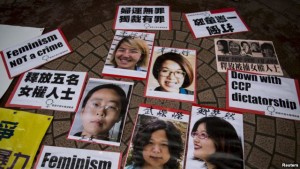 FILE – Portraits of Li Tingting (top L), Wei Tingting (top R), (bottom, L-R) Wang Man, Wu Rongrong and Zheng Churan are pictured during a protest calling for their release in Hong Kong, April 11, 2015.
FILE – Portraits of Li Tingting (top L), Wei Tingting (top R), (bottom, L-R) Wang Man, Wu Rongrong and Zheng Churan are pictured during a protest calling for their release in Hong Kong, April 11, 2015.
Shannon Van Sant
May 19, 2015 9:02 AM
HONG KONG—Earlier this year several feminists in China were arrested just before an international day celebrating women’s equality. They were some of the most visible activists in China and mostly tolerated by China’s authoritarian government, until now.
They were called the Feminist Five and China’s most prominent women’s rights actvists when police detained them ahead of International Women’s Day in March for “picking quarrels and provoking trouble.” The women’s arrest drew international condemnation. Former U.S. Secretary of State Hillary Clinton and Samantha Power, the U.S. Ambassador to the United Nations, tweeted messages of support.
Police released the women on the eve of their 37th day in prison, when they would have been required by law to formally charge them. But the activists’ detentions have left many within the womens’ rights community with questions. Iron, who prefers to go by a pseudonym, has worked with the Feminist Five on women’s issues in China.
“Because we all know that what we are doing is trying to make people’s lives better,” said Iron. “Why is the government arresting us because we try to promote anti-sexual harassment?”
Rising women’s rights movement
The detained women were Li Tingting, Zheng Churan, Wei Tingting, Wu Rongrong and Wang Man. They had planned to launch a campaign against sexual harassment on public transportation on International Women’s Day, handing out stickers and pamphlets on buses and trains.
It was not the first public event they had organized on behalf of women’s rights. In 2012, they occupied men’s public toilets to demand equal facilities for women. Some of them also previously launched a “Bloodstained Bride” campaign, during which they posed in red-stained wedding dresses to draw attention to domestic violence.
The Feminist Five occupy a new, very vocal chapter in China’s women’s rights movement.
Culturally, women were to be submissive and obedient to men and not allowed to participate in government. Under Mao Zedong, women achieved greater equality. China outlawed bound feet, and propaganda heroes included women like the Iron Girls of Shanxi Province, who built terraced farmland. Li Xiaojiang’s 1983 essay “Progress of Mankind and Women’s Liberation” was the first women’s studies publication after China became more open.
